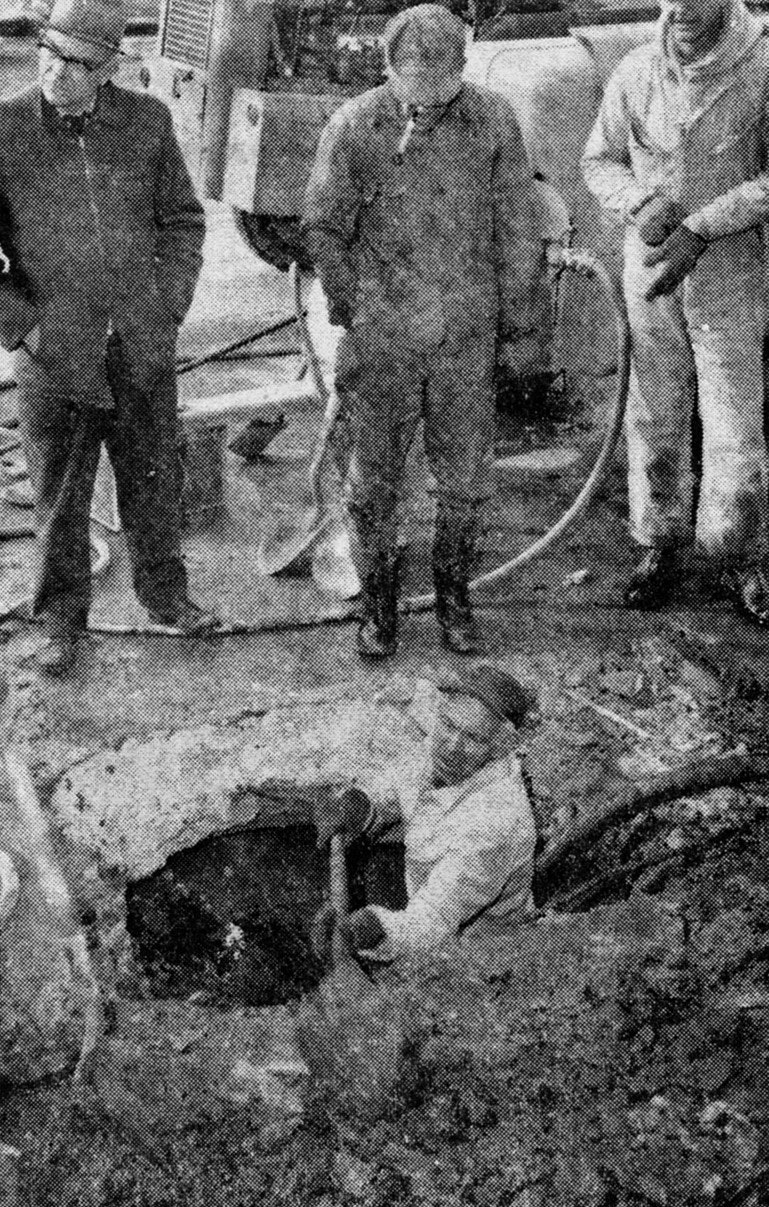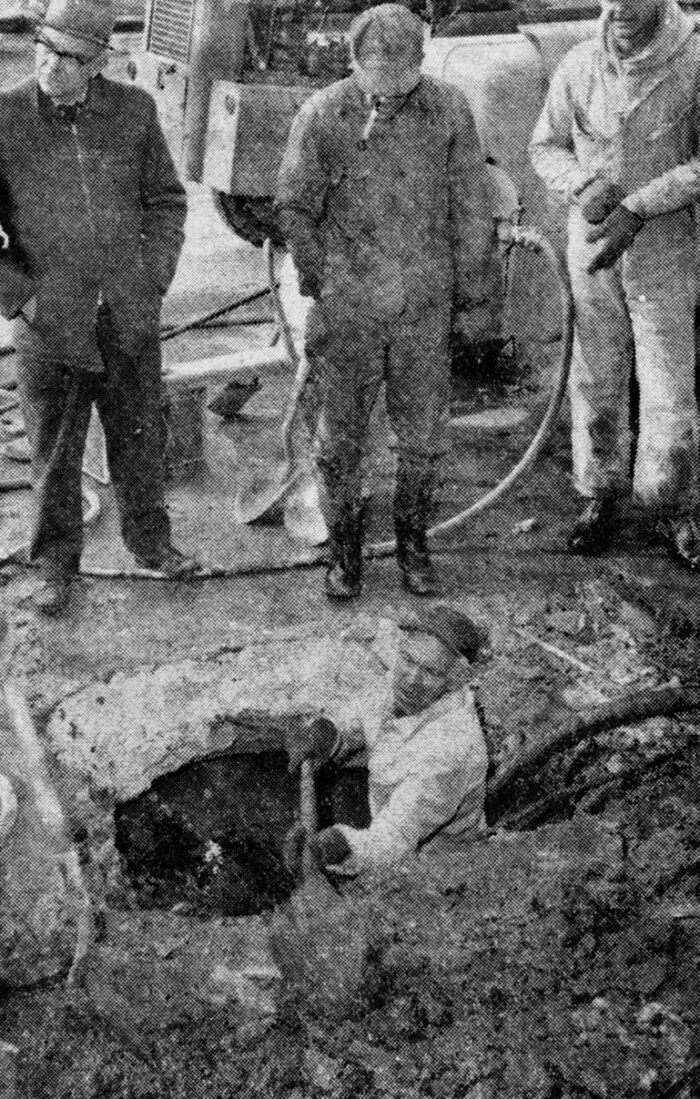Randy Evans is executive director of the Iowa Freedom of Information Council and can be reached at DMRevans2810@gmail.com.
One of the photographs of my father that I clearly remember appeared on the pages of the Bloomfield Democrat about 60 years ago.
Pop was standing chest-deep in a hole that had been hastily dug in the street on the Bloomfield city square. His face was grim. There was urgent work to be done, because much of Bloomfield was without water.
An underground main had broken a block from the city’s water tower. Water was gushing into the street and flooding basements of nearby businesses.
There, in that hole with water pooled at his ankles, Pop shoveled muck and mud to expose the leaking pipe so it could be repaired.

Noel Evans works in ankle-deep water digging out around a broken water main on the Bloomfield city square in this photo from the pages of the Bloomfield Democrat in the early 1960s. Published with permission from the Bloomfield Democrat.
In contrast with my dad, I had a soft working life. I spent much of my career in an air-conditioned office. The old photo shows Pop was not so lucky. He was a working stiff for the City of Bloomfield water department, wielding a shovel or hanging onto a jackhammer, before later moving up to operate the city’s water treatment plant.
His work days ranged from freezing, to sweltering, to all manner of conditions in between. He usually could take time for a few gulps of water from a jug during scorchers or for some hot coffee from a Thermos when he needed to thaw out.
But in Texas, not all working stiffs are as fortunate as Pop was. We have the Texas legislature and Governor Greg Abbott to thank for that.
Summers are getting hotter—much hotter—and these severe heat waves are expected to occur more frequently.
Scientists tell us the Earth experienced its hottest June in history. Across a large swath of the South, from California to Florida, people have endured a string of days with temperatures over 100 degrees. The “heat index,” what scientists describe as the “feels like” temperature, has hovered around an uncomfortable 115 degrees.
In Texas, two dozen people have died from heat-related causes in recent weeks. Last year in that state, public health officials put the total number of deaths from excessive heat at 300. Nationally, the U.S. Centers for Disease Control and Prevention reports an average of 700 people die from dangerously high heat each year.
That is why it defies common sense and public safety for Texas political leaders to enact a law that now blocks cities and counties from adopting regulations to require business owners to provide one 10-minute break every four hours for their employees who work outside.
Think about the roofers, the carpenters, the landscapers, the farm workers, the delivery drivers, and those shovel-wielding people like Pop. They cannot park behind a desk while the air-conditioning holds the room at a comfy 72 degrees.
“Banning required rest breaks for construction workers in the Texas heat is deadly,” the labor group Texas AFL-CIO said in a social media post.
David Cruz of LULAC, the League of United Latin American Citizens, a Latino civil rights organization, told the Guardian news site: “In the midst of a record-setting heatwave, I could not think of a worse time for this governor or any elected official who has any kind of compassion to do this.”
Their comments are not hypothetical hand-wringing.
The National Weather Service warned people in recent weeks, “Oppressive and persistent heat will become increasingly dangerous and potentially deadly in south and south-central Texas, especially to people repeatedly exposed for long durations. Many locations in those parts of Texas have already experienced a yearly record number of hours of dangerously high heat index readings.”
A 35-year-old utility lineman died from apparent heat-related complications after working all day in 100-degree heat while restoring storm-damaged electrical service in Marshall, Texas. A 66-year-old mail carrier collapsed in a Dallas, Texas, yard while delivering mail during a day when the heat index reached 112 degrees.
The U.S. Occupational Safety and Health Administration is working on rules all employers would have to abide by to protect their workers from heat-related dangers on the job. But such regulations are still more than a year away.
There has always been debate over the role government should take in regulating workplace safety, motor vehicle safety and water quality. These regulations, though controversial with some, have been embraced by lawmakers and administrators because they serve the greater good.
It should be the same for accommodations to protect workers during times of extreme heat.
Advocates for restricting local governments’ regulatory powers defended the new Texas law. They said it eliminates a “hodgepodge of onerous and burdensome regulations” on businesses.
Of course, what the advocates do not address are a couple of hard-to-ignore details:
One way to eliminate the burdensome hodgepodge would have been for lawmakers to enact a statewide requirement for the 10-minute breaks. It’s also worth noting that a statewide law would have had zero effect on employers who were already voluntarily providing regular time for outdoor workers to seek shade and drink water.
Cruz, the LULAC official, said the local regulations lawmakers struck down had minimal cost for Texas businesses: 20 minutes per day to protect their employees from serious injury or death.
“We have to take a stand for what is humane,” he told reporters.
The New Republic magazine was not so polite. Its article on the new Texas law carried this headline: “Texas GOP Offers Workers the Freedom to Boil Alive.”


1 Comment
It is a matter of framing.
Maybe we should refer to protection, instead of regulation.
Wally Taylor Mon 17 Jul 6:24 PM